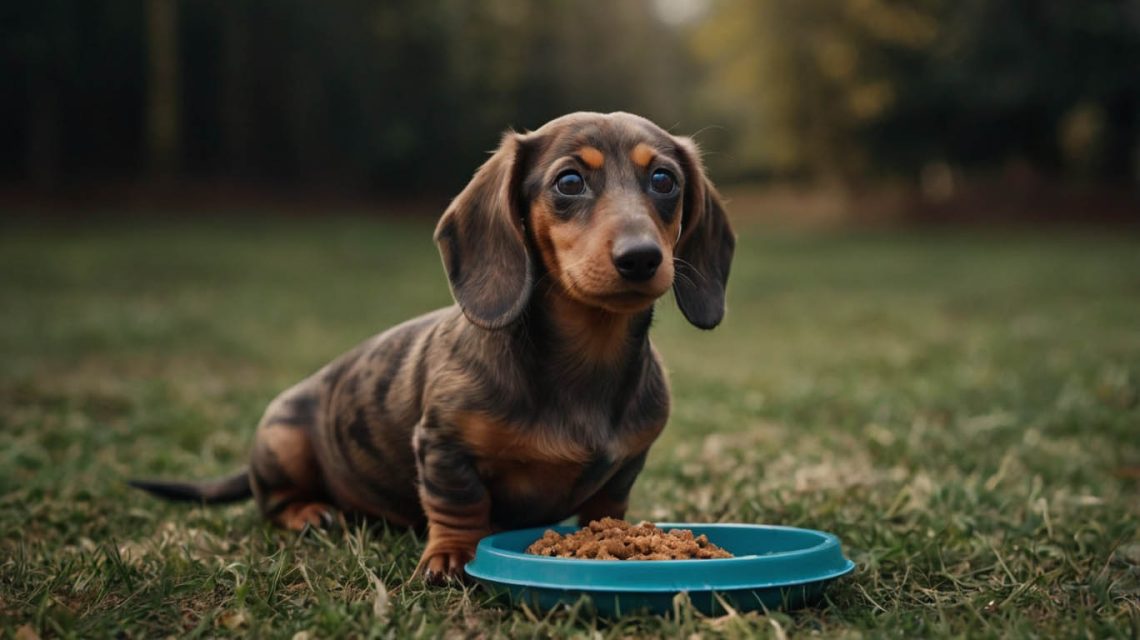Dachshund puppies are bundles of energy wrapped in adorable, long-bodied frames. Their playful nature, combined with their unique physique, means their nutritional needs require special attention. Following a Dachshund puppy feeding guide is essential to ensure proper growth, prevent obesity, and support their overall health.
In this guide, we’ll cover feeding schedules, portion sizes, food types, and practical tips to help your Dachshund puppy grow into a strong and happy dog. Whether you’re a new puppy parent or want to refine your feeding practices, this guide has you covered.
Why a Dachshund Puppy Feeding Guide is Essential
Feeding your Dachshund puppy correctly lays the foundation for a healthy life.
The Importance of Proper Feeding for Dachshund Puppies
- Supports bone and joint development
- Prevents obesity-related back problems
- Provides energy for their playful nature
- Enhances immune system function
Consequences of Improper Feeding
- Overfeeding: Leads to weight gain, increasing the risk of spinal issues like Intervertebral Disc Disease (IVDD).
- Underfeeding: Results in stunted growth and nutritional deficiencies.
By following a structured Dachshund puppy feeding guide, you ensure your puppy gets the right nutrients in the right amounts.
How Much Should You Feed Your Dachshund Puppy?
The ideal Dachshund puppy feeding guide varies based on age, weight, and activity level.
Dachshund Puppy Feeding Chart by Age
| Age (Weeks) | Meals Per Day | Portion Size (Cups/Day) |
|---|---|---|
| 8–12 weeks | 4 | 1/2–3/4 |
| 3–6 months | 3 | 3/4–1 |
| 6–12 months | 2 | 1–1.5 |
Adjusting Portion Sizes
- Increase food amounts during growth spurts.
- Monitor weight to ensure proper portion control.
Each Dachshund puppy is unique, so keep an eye on their energy levels and body condition.

What Should You Feed Your Dachshund Puppy?
Choosing the right food is just as important as determining portion sizes.
Types of Food for Dachshund Puppies
- Dry Kibble: Supports dental health and is convenient to store.
- Wet Food: Hydrating and more appealing to picky eaters.
- Raw Diet (Vet-Supervised): Nutrient-rich but requires careful handling.
Key Nutritional Requirements
- Protein: Essential for muscle development.
- Fats: Provide energy and support coat health.
- Carbohydrates: Offer sustained energy.
- Vitamins & Minerals: Boost immunity and overall health.
Recommended Dog Food Brands for Dachshund Puppies
- Hill’s Science Diet Puppy Formula
- Royal Canin Dachshund Puppy Food
- Blue Buffalo Puppy Recipe
Look for foods specifically formulated for small breed puppies.
Dachshund Puppy Feeding Schedule
A regular feeding schedule helps your Dachshund puppy establish a routine and supports digestive health.
Ideal Feeding Times
- Morning: 7:00 AM
- Midday: 12:00 PM
- Afternoon: 4:00 PM
- Evening: 8:00 PM
Transitioning to Fewer Meals
- At 6 months, reduce meals to three times a day.
- By 12 months, transition to two meals a day.
Consistency is key to a happy, well-fed Dachshund puppy.
Signs Your Dachshund Puppy is Eating the Right Amount
Monitoring your puppy’s health is essential to ensure they are eating correctly.
Healthy Feeding Signs
- Steady weight gain
- Bright eyes and a shiny coat
- High energy levels
- Healthy stool consistency
Warning Signs of Overfeeding or Underfeeding
- Overfeeding: Rapid weight gain, bloating, and lack of energy.
- Underfeeding: Visible ribs, weakness, and constant begging for food.
If you notice these signs, adjust portions and consult your veterinarian.
Common Dachshund Puppy Feeding Mistakes to Avoid
Even with the best intentions, mistakes can happen. Here’s what to avoid:
- Overfeeding Treats: Treats should not exceed 10% of daily calories.
- Free-Feeding: Leaving food out all day encourages overeating.
- Inconsistent Feeding Times: Stick to a regular schedule.
- Feeding Human Food: Foods like chocolate, grapes, and onions are toxic.
Avoid these pitfalls to keep your puppy healthy and happy.
Real-Life Story: Milo’s Nutrition Transformation
Milo, a Dachshund puppy, struggled with weight gain due to overfeeding. His owner followed a structured Dachshund puppy feeding guide, adjusted portion sizes, and switched to high-quality puppy food.
Within weeks, Milo’s energy levels improved, and he achieved a healthy weight.
This story highlights the importance of accurate feeding practices.
Transitioning to Adult Dog Food
Your Dachshund puppy will need adult food as they mature.
When to Transition to Adult Food
- Around 12 months of age.
How to Transition Smoothly
- Gradually mix adult food with puppy food over 7–10 days.
- Increase the ratio of adult food daily.
This approach minimizes digestive discomfort.
Tips for Stress-Free Mealtimes
Mealtime should be enjoyable and stress-free for your Dachshund puppy.
- Use slow-feeder bowls to prevent gulping.
- Create a quiet feeding space.
- Avoid distractions during meals.
- Provide clean, fresh water at all times.
These small changes make a big difference.
Is the Dachshund Puppy Feeding Guide Right for Your Pup?
Every puppy is unique, and while the Dachshund puppy feeding guide provides a solid foundation, you should tailor it to your puppy’s needs.
- Monitor weight and body condition.
- Adjust portion sizes if needed.
- Consult your vet regularly.
Proper feeding ensures your Dachshund puppy grows into a healthy and happy adult dog.
Final Thoughts on Dachshund Puppy Feeding Guide
Feeding your Dachshund puppy isn’t just about filling their bowl—it’s about providing balanced nutrition, sticking to consistent schedules, and monitoring their growth. By following this Dachshund puppy feeding guide, you’ll give your puppy the best possible start in life.
With love, attention, and the right diet, your Dachshund puppy will grow into a loyal and joyful companion.
FAQs
How often should I feed my Dachshund puppy?
Puppies under 3 months need four meals daily, reducing to two by 12 months.
What’s the best food for Dachshund puppies?
High-quality puppy food formulated for small breeds is ideal.
Can I feed homemade food to my Dachshund puppy?
Yes, but ensure it’s balanced and vet-approved.
When should I switch my Dachshund puppy to adult food?
At around 12 months of age.
What are signs of overfeeding my Dachshund puppy?
Weight gain, bloating, and low energy levels.


